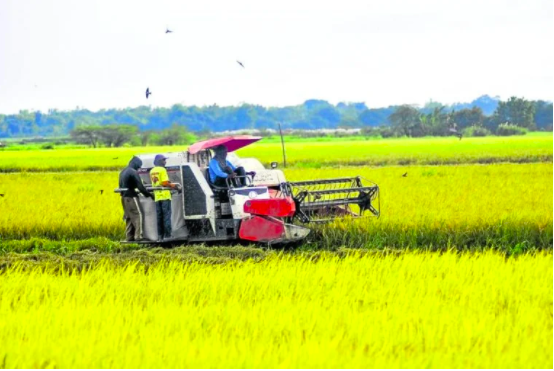Govern agriculture right

Farmers harvested rice at Barangay Unzad in Villasis town in Pangasinan province.| Inquirer.net file photo (Willie Lomibao)
No doubt, agriculture now deserves top attention among the three economic sectors, over industry (mostly manufacturing) and services (with its mix of low- and high-value activities). The global food crisis that COVID-19 and Russia’s invasion of Ukraine triggered will get worse, and the worst hit will be the poor and hungry, whose numbers grew substantially in the last two years.
What also grew through the pandemic was the number of workers in our farm sector, numbering 9.7 million in January 2020, and 11.4 million by June 2022. Many took refuge from jobs lost in transport, food and accommodation services, and manufacturing. But guess what: even as agriculture gained 1.7 million additional workers, its output in gross value added fell from P439.72 billion in Q1-2020 to P416.89 billion in Q2-2022 (in constant 2018 prices). This means that farm productivity per worker dropped from P45,500 in early 2020 to only P36,600 in mid-2022. That meant lower incomes as well.
Contrast this with industry and services, where productivity per worker rose in the same period from P167,200 to P171,900 and from P106,290 to P115,800, respectively. These numbers are yet another proof that our agriculture is in deep trouble. It’s bad enough that productivity per worker in the sector is a mere third of those in services and less than a fourth of those in industry. But it fell significantly as well! Our singular challenge is to make our farms and farm workers far more productive than they have been all this time.
To put it bluntly, we can no longer just entrust our struggling farms and farmers to the Department of Agriculture (DA), which by all indications failed on its mission to raise their productivity and incomes, thinking that keeping competing imports out was the way. History tells us the effect was the exact opposite. Raising agri productivity is a government-wide mission, and local government units (LGUs) must especially step up and take charge, as the Local Government Code of 1991 had mandated. Yet more than three decades later, people still seem to look to the DA to do the rowing for agriculture, when they should properly limit themselves to steering, consistent with the good governance principles of devolution and subsidiarity.
Here’s some unsolicited advice for our President cum agriculture secretary. First, clean up the DA bureaucracy to weed out the corrupt and incompetent, and thoroughly revamp the organization to effectively fulfill its proper steering role. Only the President can do it without fear of political backlash that tied the hands of past true reformers—and that’s why his assuming the portfolio could still be a good idea. But he must be sincerely motivated to clean it all up and put it in shape, and knows the whos, whats, and hows to get it done.
Second, refocus and limit DA to its steering roles: setting sound policies and standards, enforcing essential regulations, pursuing beneficial international relations, and most critically, capacitating provincial governments to provide the right technical supervision to field workers within their areas. The last has always been the gap. DA has historically purveyed top-down, one-size-fits-all fixes (thus justifying central procurement with all its attendant temptations). But this cannot work in a country where agro-ecological and cultural circumstances vary widely. Leave solving problems to the levels of governance closest to them.
Fourth, crack the whip to get government and nongovernment entities concerned in the entire agriculture value chains to move as one. President Ramos showed how, and it takes an inspiring kind of leadership to make it happen. That’s perhaps a tall order for this President, but let him surprise us.
cielito.habito@gmail.com
Disclaimer: The comments uploaded on this site do not necessarily represent or reflect the views of management and owner of Cebudailynews. We reserve the right to exclude comments that we deem to be inconsistent with our editorial standards.
